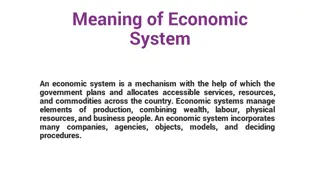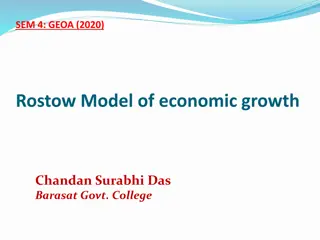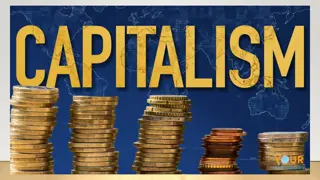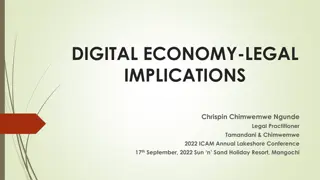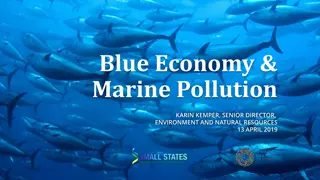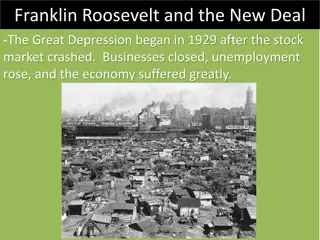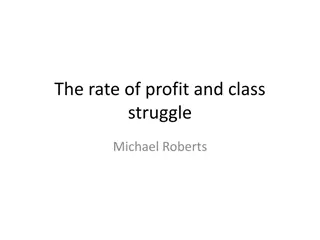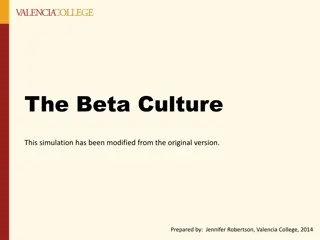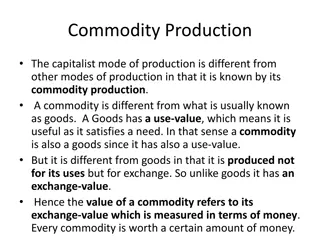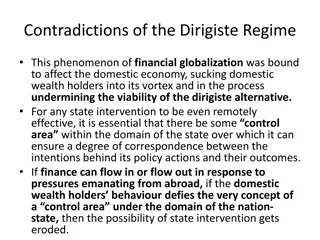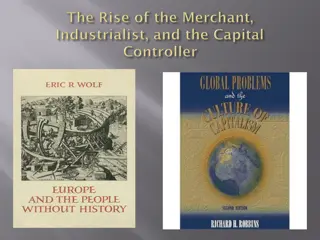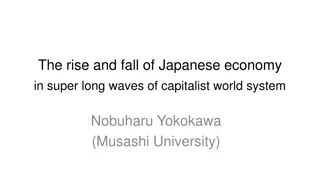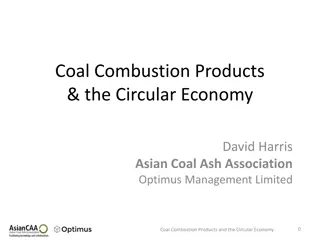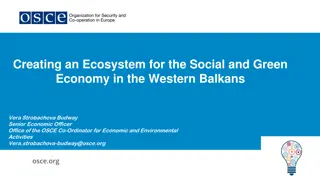Uncovering the Violent History of Capitalistic Enclosures
Explore the historical context of capitalist enclosures, their violent impacts on peasants, and the moral justifications used to conceal these atrocities. Delve into how economic narratives created moral bubbles to justify violent acts, as examined through the lens of Marx's analysis. Unveil the par
0 views • 11 slides
Glossary of Key Terms
Explore essential terms in economics such as command economy, consumer, demand, economic system, free enterprise system, goods, innovation, market economy, marketplace, mixed economy, needs, producer, profit, resources, scarcity, services, supply, technology, trade-off, traditional economy, and want
3 views • 6 slides
Understanding Markets and Economic Structures
Markets play a crucial role in bringing buyers and sellers together for transactions. This article discusses the concept of markets, different types of markets in a capitalist economy, focusing on perfect competition. It outlines the features and conditions of perfect competition, emphasizing the im
2 views • 42 slides
Understanding Economic Systems and Sectors
An economic system is a mechanism through which the government plans and allocates resources and services. Types include capitalist, socialist, and mixed economies, each with distinct characteristics. The central problem of the economy is managing scarcity. The economic sector comprises the primary,
2 views • 5 slides
Leveraging Non-Oil Exports for Nigeria's Blue Economy Growth
Nigeria Export Promotion Council (NEPC) focuses on diversifying Nigeria's economy by promoting non-oil exports for sustainable growth. The Blue Economy concept involves sustainable use of ocean resources for economic development. Nigeria's abundant ocean resources such as maritime transportation, fi
0 views • 20 slides
Walt Whitman Rostow's Model of Economic Growth - A Historical Perspective
Walt Whitman Rostow, an economist, proposed the Stages of Economic Growth theory in 1960, outlining the five stages through which countries pass to achieve economic development. His model reflects Western capitalist ideologies and was influenced by Cold War politics. Rostow's theory aimed to guide d
0 views • 19 slides
Exploring Responsibility and Social Change in 'Young and Old' Play
In the play "Young and Old," the characters Eric, Sheila, and Gerald represent the younger generation, while Arthur and Sybil symbolize the older generation. The story delves into the concept of responsibility, highlighting the different attitudes towards Eva's death. Arthur and Sybil, despite being
0 views • 9 slides
The Formation of Intellectuals in Society: Insights from Gramsci
Intellectuals are individuals who utilize their intellect and specialized education to generate ideas and knowledge essential for the functioning of societal production systems. Gramsci delves into how different social groups or classes form their own intellectuals, highlighting processes, historica
0 views • 20 slides
Understanding Indian Economy: Course Outcomes and Resources
Explore the course outcomes of the Indian Economy, covering economic development, policies, population growth, planning, agriculture, Kerala's economy, and resources for further study. Access government data and publications on the Indian economy for comprehensive learning.
0 views • 9 slides
Understanding Socialism: A Comprehensive Overview
Socialism is a political and economic ideology that advocates for collective or state ownership of production, distribution, and exchange. It emerged in the early 19th century as a response to industrial capitalism, aiming for a more egalitarian society that prioritizes collective well-being. Social
0 views • 9 slides
The Significance of Money in a Capitalist Economy
Money plays a crucial role in a capitalist economy by facilitating the price mechanism, consumption decisions, production activities, and income distribution. It enables rational choices for consumers, trade organization for producers, and serves as the basis for credit systems. Without money, the c
0 views • 5 slides
Understanding Capitalism, Modernism, and Postmodernism in Literature
Terry Eagleton's essay delves into the impact of capitalism on art and literature, exploring the emergence of modern and postmodern literature in the capitalist and late capitalist eras. He discusses how late capitalism influences art with characteristics like mass consumerism and virtual reality. P
1 views • 7 slides
Legal Implications of the Digital Economy in Malawi
Explore the legal implications of the digital economy in Malawi as discussed at the ICAM Annual Lakeshore Conference. Topics include the Electronic Transactions and Cyber Security Act, principles of implementation, Malawi CERT, data privacy, and the significance of the digital economy in transformin
0 views • 44 slides
Overview of Modern Business Environment in Indian Economy
Modern business in the Indian economy is characterized by large size, oligopolistic nature, diversification, global presence, technology orientation, and changing government regulations. The Indian economy features a mixed economy with both private and public enterprises, low per capita income, uneq
0 views • 14 slides
Insights into India's Thriving Gig Economy and Future Work Trends
India's gig economy, spearheaded by initiatives like IWWAGE, is reshaping the future of work, particularly for women. Key questions revolve around the gig economy's impact, legislative frameworks, and COVID-19 repercussions. Academia investigates the rise of gig work, focusing on platforms like Uber
0 views • 11 slides
The Blue Economy and Marine Pollution: A Comprehensive Overview
The presentation outlines the thriving ocean economy, the concept of the Blue Economy, the World Bank's approach, risks faced by oceans, and the impact of marine pollution on Small Island Developing States and coastal regions. It emphasizes sustainable development of oceanic activities, collaboratio
1 views • 12 slides
Examining State-Level and Dyadic Explanations for War in Global Politics
Understanding the reasons why certain states are more war-prone than others involves exploring factors such as economy, internal opposition, and political systems. Marxist explanations argue that capitalist economies are more prone to war due to issues like overproduction, wealth inequality, and imp
0 views • 17 slides
Evolution of Liberal Citizenship Theory
The liberal theory of citizenship emphasizes the essential components of right, responsibility, and identity within a political community. It contrasts with pre-capitalist societies by offering a weak sense of membership and reduced citizen obligations. The addition of social rights has brought an e
0 views • 15 slides
Franklin D. Roosevelt and the New Deal During the Great Depression
The Great Depression of 1929 led to high unemployment, closed businesses, and economic suffering. President Hoover's laissez-faire policies failed to address the crisis adequately. In the 1932 election, FDR introduced the New Deal with a focus on Relief, Recovery, and Reform to combat the Depression
2 views • 13 slides
Perspectives on Youth Culture Through Functionalist and Neo-Marxist Views
Functionalist and Neo-Marxist perspectives on youth culture offer contrasting views on its purpose in society. Functionalist theorists emphasize the role of youth culture in providing a transitional phase for young people, aiding in their social integration and development of independence. On the ot
0 views • 11 slides
Building Socialism: Strategies for Social Change and Political Action
Explore the process of social change towards socialism through mass action, organization, and the building of a socialist party. Emphasizing the importance of campaigns, reforms, and transitional methods, the journey involves uniting the working class, challenging the capitalist system, and particip
4 views • 10 slides
Understanding the Law of Profitability in Capitalist Accumulation
Explore the relationship between the rate of profit, class struggle, and capitalist accumulation. From the general law of accumulation to the law of profitability, examine how displacing labor affects the average rate of profit and learn about Marx's law of profitability. Discover the evidence from
0 views • 17 slides
The Beta Culture Overview and Cultural Guidelines
The Beta Culture is characterized by a capitalist society focused on individual wealth accumulation, valuing hard work and equality. Social norms dictate greetings with a nod, avoiding discussion of wealth or family, and a unique trading language for engaging in transactions. Betans prioritize perso
0 views • 4 slides
Insights into Social Economy and Social Dialogue Research Outcomes
Research outcomes from the Mesmer+ project at HIVA KU Leuven reveal misalignments in social dialogue inclusiveness, challenges faced by social economy entities, and the role of employers in the social economy. Recommendations include enhancing the role of social economy employers and promoting inclu
1 views • 7 slides
Exploring the Green Economy and BRICS Cooperation
The discussion focuses on the importance of the green economy for BRICS nations, suggesting ways for collaboration, especially in addressing climate change and transitioning to a low-carbon economy. The BRICS countries play a crucial role in global stability and sustainable development. Features of
0 views • 22 slides
The Role of Corporate Law in Wealth Distribution and Capitalism
Exploring the evolution of corporations within capitalist frameworks, this analysis delves into the intertwined concepts of managerialism, infinite wealth accumulation, and the social-historical embeddedness of corporations. Through historical contexts and theoretical perspectives, the discussion de
0 views • 17 slides
Labor Super-Exploitation and Value Transfer in Global Economy
Original research explores how labor super-exploitation and transformation drive international value transfer in the capitalist system. The study bridges orthodox Marxist and Ricardian perspectives, offering new insights into unequal exchange and imperialism.
1 views • 21 slides
Understanding Commodity Production and Labor in Capitalist Mode
The capitalist mode of production is characterized by commodity production, where goods are produced not for their use but for exchange. The value of a commodity is determined by its exchange value, measured in money, which is influenced by the quantity of labor involved in its production. Labor, be
0 views • 8 slides
Exploring the Moral Foundations of Capitalism
Delve into the historical origins and ethical principles underpinning capitalism as seen through iconic quotes, foundational texts, and philosophical analysis. Understand the intertwined concepts of liberty, economics, philosophy, and ethics that shape capitalist ideology and practices, emphasizing
0 views • 42 slides
Economic Transformations in Latin America during the Late 19th Century
The late 19th century in Latin America marked a period of significant economic changes driven by a global context that included events like the Great Depression of 1873-1896 and the second industrial revolution. Core capitalist powers sought cheap raw materials, labor, and new markets, leading to in
1 views • 17 slides
The Impact of Pandemics on the Shadow Economy Performance
Pandemics have a significant impact on the shadow economy, influencing the legal economy in various ways. The shadow economy serves as a buffer for high unemployment rates and can contribute to budget revenues through legal spending. Studies suggest that a growing shadow economy may reflect dissatis
0 views • 12 slides
Challenges of the Dirigiste Regime in Financial Globalization
The Dirigiste regime faced contradictions in the context of financial globalization, impacting domestic wealth holders and the effectiveness of state interventions. Internal contradictions and the need for state involvement in infrastructure development and economic regulation further complicated th
0 views • 12 slides
Evolution of Services Marketing in the Modern Economy
The shift towards a service economy has transformed marketing practices, leading to the emergence of Services Marketing as a distinct discipline. This evolution highlights the unique characteristics of services, such as intangibility and simultaneous production-consumption. The 1980s mark a pivotal
0 views • 13 slides
Critique on Educational Systems and Social Inequality
The content explores how current educational approaches, student assessments, and the capitalist influence in education contribute to social inequality. It discusses the role of education as an equalizer, challenges the meritocracy assumption, and highlights how schools can perpetuate economic dispa
0 views • 6 slides
The Emergence of Capitalism and Global Trade Dynamics
European expansion from the 15th century onwards saw the rise of a commercial network on a global scale, driven by a blend of economic interests and political power. The capitalist system evolved through strategic trade, market expansions, and a regional division of labor. The movement of goods and
0 views • 58 slides
The Learning Consortium for the Creative Economy Webinar Summary
The webinar on The Learning Consortium for the Creative Economy discussed key topics such as agenda details, presenters' backgrounds, poll results, and insights on the Creative Economy and its importance. Participants engaged in discussions on topics like the Recap on the Creative Economy, Scaling o
0 views • 43 slides
Contrasting Early Colonial Regions in America
Early New England, Middle, and Southern colonies differed in economics, geography, culture, government, and relations with American Indians. New England focused on subsistence farming and democratic town meetings. The Middle colonies benefited from fertile land and trade along rivers. The Southern c
0 views • 13 slides
The Rise and Fall of Japanese Economy in Capitalist World System
After the financial crisis of 2007 marked the beginning of the end of the postwar capitalist world system, a period of discontinuity emerged, signifying an opportunity to create a more stable economic system. By analyzing the long and super long waves of capitalist economy, particularly focusing on
0 views • 24 slides
Coal Combustion Products & the Circular Economy - Addressing Resource Flow Challenges
This discussion delves into the intersection of coal combustion products and the circular economy, emphasizing the need for continuous re-evaluation of resource chains, ecosystem metabolisms, and industrial innovations to ensure sustainable environmental practices and economic growth. Exploring the
0 views • 24 slides
Advancing Social and Green Economy in Western Balkans
Creating an ecosystem for social and green economy in the Western Balkans is crucial for fostering peace, reducing disparities, and promoting sustainable business models. Initiatives like promoting innovation, job creation, and skills development among young entrepreneurs are key to driving growth a
0 views • 7 slides



